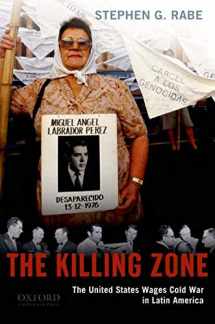
The Killing Zone: The United States Wages Cold War in Latin America
ISBN-13:
9780195333220
ISBN-10:
0195333225
Edition:
1
Author:
Stephen G. Rabe
Publication date:
2011
Publisher:
Oxford University Press
Format:
Hardcover
256 pages
FREE US shipping
Book details
ISBN-13:
9780195333220
ISBN-10:
0195333225
Edition:
1
Author:
Stephen G. Rabe
Publication date:
2011
Publisher:
Oxford University Press
Format:
Hardcover
256 pages
Summary
The Killing Zone: The United States Wages Cold War in Latin America (ISBN-13: 9780195333220 and ISBN-10: 0195333225), written by authors
Stephen G. Rabe, was published by Oxford University Press in 2011.
With an overall rating of 4.0 stars, it's a notable title among other
books. You can easily purchase or rent The Killing Zone: The United States Wages Cold War in Latin America (Hardcover) from BooksRun,
along with many other new and used
books
and textbooks.
And, if you're looking to sell your copy, our current buyback offer is $0.44.
Description
This text will be a concise, interpretive history of U.S. policies in Latin America during the Cold War. This book would be written to the highest scholarly standards but would be accessible to upper-level college students and graduate students at universities. The goal is to write a sharp, bold analysis of U.S. activities in Latin America during the post-war period, a critical time in the history of the Cold War and in the history of inter-American relations. Due to the broad nature of the topic, this book can be used as a supplement in many courses: U.S. Foreign Policy, Cold War, U.S. Relations with Latin America, and even a Modern Latin America course. Oddly, there is not much direct competition for the proposed book - only Intimate Ties, Bitter Struggles: The United States and Latin America since 1945 by Alan McPherson (Potomac Books). This text, however, will differ in focus than McPherson's text. The book argues that the United States proved especially effective in winning the Cold War in Latin America. Through overt and covert means, the United States destabilized governments throughout the hemisphere. U.S. policymakers judged these governments as Communist, tolerant of communism, or oblivious to the Communist menace. The United States struck against governments that followed constitutional procedures and democratic processes and professed to be committed to socioeconomic reform. During the period from 1945 to 1989, the United States destabilized governments in Argentina, Brazil, British Guiana (Guyana), Bolivia, Chile, Dominican Republic, Ecuador, El Salvador, Guatemala, Nicaragua, and Uruguay.


We would LOVE it if you could help us and other readers by reviewing the book
Book review

Congratulations! We have received your book review.
{user}
{createdAt}
by {truncated_author}


